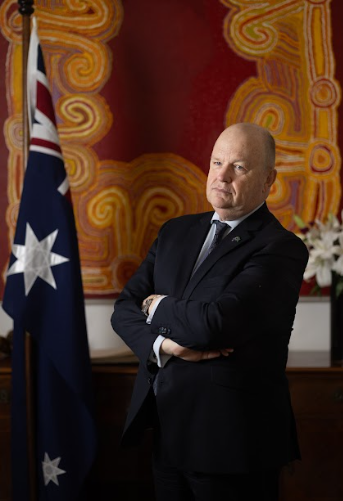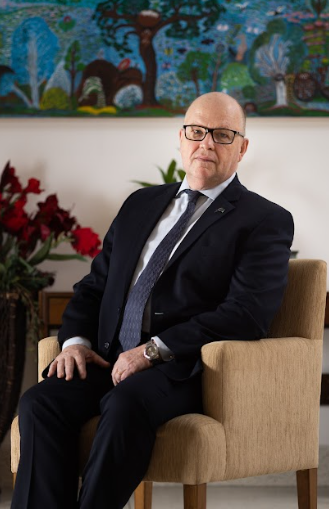The Indo-Pacific region is our frame of reference for the world: Australian High Commissioner
Australia was one of the first nations to recognize Bangladesh after it achieved independence. On 13 March 1972, Australia’s former Deputy High Commissioner and chargé d’affaires to Bangladesh, Jim Allen, was appointed as Australia’s first Ambassador to Bangladesh, before becoming High Commissioner following Bangladesh’s admission to the Commonwealth of Nations on 18 April 1972. As Jeremy Bruer, the 17th High Commissioner, concludes his four-year posting to Bangladesh, he discusses the highs, lows, and the profound impact of his diplomatic odyssey.
Navigating Unprecedented Challenges
“It’s been an experience with both challenges and successes, and the proof of how much I’ve enjoyed this posting is evident in my request for a one-year extension,” the High Commissioner reflects on the complexities of his diplomatic tenure. Facing the global upheaval brought on by the COVID-19 pandemic, the High Commissioner acknowledges the difficulties posed by restrictions, saying, “Days after presenting credentials, I found myself prevented from meeting the people I needed to engage with due to pandemic restrictions. It was not optimal, professionally or personally.”
Strategic Milestones: Trade and Defence Adviser’s Office
Amidst these challenges, the High Commissioner takes pride in strategic accomplishments. “Despite the hurdles, we’ve managed to make significant strides in advancing the trade relationship between Australia and Bangladesh,” the High Commissioner asserts. Highlighting a significant development, the High Commissioner states, “We successfully established a Defence Adviser’s office in our mission here, signaling a deepening of our relationship and a recognition of its multifaceted nature.”
Australia thinks of the world in terms of the Indo-Pacific. It is our frame. We have the Indian Ocean on one side and the Pacific Ocean on the other side. So, as I’ve said publicly on several occasions, when we look at the world, when things come to Australia, when people travel to Australia, when they travel from Australia when trade takes place in and out of Australia, it comes through the Indian Ocean, it comes through the Pacific Ocean and we want to see a peaceful, stable, prosperous and inclusive region.”
Jeremy Bruer
Cultural Connections: Beyond Diplomacy
Beyond the formalities of diplomacy, the High Commissioner delves into the softer aspects of cultural exchange. “Personal relationships and the warmth of the people will be missed the most,” the High Commissioner reflects on the intangible but lasting impact of the posting. The High Commissioner emphasizes the human side of diplomacy, stating, “You can feel the pulse of Bangladesh in its streets, and the ambition and aspirations of its people are palpable. That’s what I love most about this country.”
Australia’s Growing Understanding
When asked about influencing Australia’s perception of Bangladesh, the High Commissioner adopts a modest tone. “I hesitate to claim too much credit, but there has undoubtedly been a maturing in our understanding of Bangladesh,” the High Commissioner remarks. Recognizing the impact of Bangladesh’s achievements and its resilient spirit, the High Commissioner adds, “The growing Bangladeshi community in Australia, around 80,000 strong, has played a crucial role in fostering a broader understanding of Bangladesh.”
Trade Growth and Diversification
The economic landscape takes center stage as the High Commissioner explores the growth in trade between the two nations. Bangladesh and Australia have witnessed a substantial expansion in bilateral trade over the past decade, reaching approximately $4 billion annually”. Bangladesh now ranks as Australia’s 32nd largest trading partner. Looking to the future, the High Commissioner sees potential beyond traditional exports, stating, “There’s scope for much further growth given our geographic proximity, especially in sectors like food, education services, and the exploration of jute products.”
A Sustainable Future
As climate change becomes a global priority, the High Commissioner discusses collaborative solutions for a sustainable future. “Both Australia and Bangladesh are vulnerable to climate change, and we see it as a key economic and security challenge,” the High Commissioner states. Expressing Australia’s commitment to becoming a clean energy superpower, the High Commissioner says, “We are very keen to support Bangladesh’s efforts. We have just seen COP and I think that increasingly the world is sort of sharpening its focus and sharpening its efforts.” In areas of collaboration, including technology transfer and a focus on low-emission technologies like green hydrogen, the envoy emphasizes, “We’ve got quite a good record of having reduced our emissions over the last 20 years or so. And in Bangladesh, we think some of those technological solutions might be available even in the transition phase. We’d be happy to share experiences between Australia and Bangladesh. We’d welcome technology transfer between our two countries about those issues. Increasingly that would include low emission technologies like green hydrogen, which is something there’s a lot of investment in Australia at the moment, which I think there’s a lot of work being done.”
Nurturing Relationships
Education emerges as a cornerstone for building lasting connections between the two nations. “I suppose one of the things that any diplomat wants to see is greater connections between people. And I see education as being one of the best ways of doing that. The increasing number of Bangladeshi students studying in Australia is a testament to the strength of our educational ties. If you can create an environment in which somebody can travel from one country, spend time in that other country, understand its culture, and get something positive from it in return, then I think we’re going a long way towards doing that,” the High Commissioner observes. Discussing joint campuses and diploma programs, the High Commissioner states, “It has a development impact as well, so if the person then returns with skill or knowledge that they can then apply in a way that helps drive the development, say, of Bangladesh, then you’ve got a kind of a win-win situation. So we support that very strongly.” These initiatives act as pathways for students to gain international exposure while contributing to the development of both countries.
Investment Opportunities: A Two-Way Street
Addressing the question of investment, the High Commissioner emphasizes the mutual benefits of increased foreign direct investment. “Investment in both directions would be very beneficial, helping consolidate commercial relationships and sustaining increased trade,” the High Commissioner remarks. Highlighting key considerations for potential Australian investors, the High Commissioner states, “Ease of doing business, secure repatriation of profits, and transparent dispute resolution mechanisms”.
The Future of Bilateral Relations
As the High Commissioner prepares to bid farewell, the focus turns to the future of Australian-Bangladeshi relations. “Well, Australia thinks of the world in terms of the Indo-Pacific. It is our frame. We have the Indian Ocean on one side and the Pacific Ocean on the other side. So, as I’ve said publicly on several occasions, when we look at the world, when things come to Australia, when people travel to Australia, when they travel from Australia when trade takes place in and out of Australia, it comes through the Indian Ocean, it comes through the Pacific Ocean and we want to see a peaceful, stable, prosperous and inclusive region,” the High Commissioner states. Expressing optimism about the future, the High Commissioner highlights shared economic interests, people-to-people connections, and collaborative efforts in addressing global challenges.



